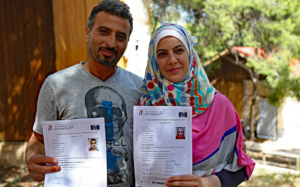Qualifications passport for refugee on the way
UNESCO is leading a push to introduce a globally recognised Qualifications Passport to help displaced people access jobs, training and education.
Worldwide, forced migrants face major obstacles in getting their qualifications recognised, so the UNESCO plan is to introduce a global version of Qualifications Passports for refugees are now being rolled out in Europe.
 “A Universal Qualifications Passport (UQP) under the auspices of UNESCO could become a modern universal tool to facilitate the mobility for refugees with qualifications, and may even be used at a later stage, as a mobility tool for migrants around the globe,” the UN’s educational, scientific and cultural Organisation said in a statement.
“A Universal Qualifications Passport (UQP) under the auspices of UNESCO could become a modern universal tool to facilitate the mobility for refugees with qualifications, and may even be used at a later stage, as a mobility tool for migrants around the globe,” the UN’s educational, scientific and cultural Organisation said in a statement.
“In addition, the UQP could serve as a complementary apparatus for the implementation of the future Global Recognition Convention, and the implementation of provisions on recognition of refugees and displaced persons in the Revised Regional Recognition Conventions,” it said.
So far in Europe, hundreds of refugees have received European Qualifications Passport for Refugees, which gives education institutions, employers and the refugee a statement about his or her qualifications.
It can help refugees continue their education and training or find work. Equally important is guidance: the Qualifications Passport offers advice on the road ahead, outlines opportunities and is easy to understand.
The first Qualifications Passports were issued in Norway, and subsequently other countries have joined in: Greece, Italy, and the Netherlands. Ministries and national centres for information on recognition and mobility in nine countries have laid down vital contributions to the scheme.
The Qualifications Passports have received very positive feedback with tests of the methodology having been performed in Armenia, Germany, Lebanon and Turkey.
“The experience so far is that the Qualifications Passports do not only serve their main purpose of documenting qualifications but also have a substantial positive side-effect of building capacity in modern recognition methodology in higher education institutions and recognition agencies locally. As a structural element, it supports and strengthens global, regional, national and local initiatives for the inclusion of refugees into society, education systems and the labour market,” the UNESCO statement said.
“Increasingly important, the Qualifications Passport is designed to have value across borders, in cases where the forced migrant is being resettled,” it said.
In Europe, the process of applying for a Qualifications Passport involves a refugee’s qualifications and related competencies being identified, assessed and presented in a statement written by professional evaluators. The methodology includes the use of a self-assessment and a structured interview.
The methodology is built on five principles: accessibility, fairness, professionalism, relevance and fast processing. The procedures are intended to be easy to understand and free from bottlenecks.
UNESCO says Universal Qualifications Passports should be made available to as many as possible, so differences in language proficiency, systemic trust and a whole range of other factors are taken into consideration.
“There is now a potential to work together within a common framework to make the Qualifications Passports a global scheme for forced migrants. Increased cooperation within the field of recognition may in itself contribute to better systems for global recognition of qualifications. Collaborative efforts create trust between governments, higher education institutions and recognition offices, and trust is the foundation for the entire practice of recognition,” the statement says.












